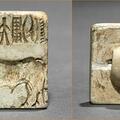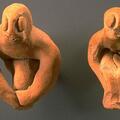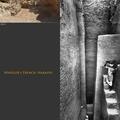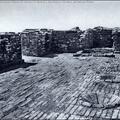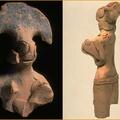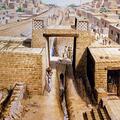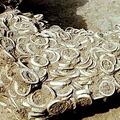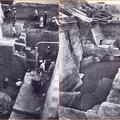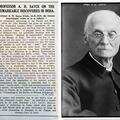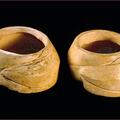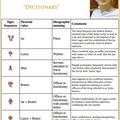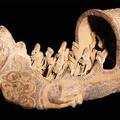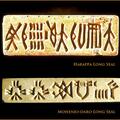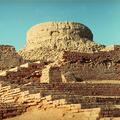Today an unusual and spectacular exhibition opens at the National Museum of Oriental Art (MNAO) 'Giuseppe Tucci' in Rome, Italy.
344 posts, also carried on our Facebook page, about the ancient Indus Valley civilization, including important news, research and occasional visits to museums with ancient Indus artifacts.
Jun 21, 2014
"At their best, it would be no exaggeration to describe them as little masterpieces of controlled realism, with a monumental strength in one sense out of all proportion to their size and in another entirely related to it," wrote Sir Mortimer Wheeler.
Seal with
Jun 19, 2014
Although there are fewer male than female figurines to be found at Indus sites, these terracotta males from Harappa give some sense of the principles underlying their representations.
Jun 17, 2014
Sir Mortimer Wheeler's famous trench at Harappa in 1946 and today, when it has been filled in once again.
Jun 14, 2014
Was this an ancient Mohenjo-daro restaurant? Sir Mortimer Wheeler writes "Of another kind is a building fronting upon one of the main streets, 'First Street', in VR Area [Mohenjo-daro]. Its outside dimensions are 87 by 64.5 feet, but within that considerable
Jun 12, 2014
Image A:Two female figurines nursing infants found at Harappa. The female figurine usually holds the infant's head to her breast with one or both arms encircling the infant.
LEFT: The female figurine usually holds the infant's head to her breast with one or
Jun 10, 2014
One of the most detailed reconstructions of an ancient Indus gateway, this one on Mound E at Harappa. The reconstruction was drawn by Chris Sloan, based on the work done by the Harappa Archaeological Research Project. J.M.
Jun 7, 2014
Why was this shell bangle workshop suddenly abandoned in Gola Dhoro, Gujarat? Great wealth was left behind.
Jun 5, 2014
How old are ancient Indus cities? Excavations at Harappa show activity going back to approximately 3500 BCE, as do excavations at Mohenjo-daro. Neither site has been fully excavated, however. Attempts to go deep at Mohenjo-daro failed.
Jun 3, 2014
The dating of the ancient Indus civilization was actually done through a Letter to the Editor of the Illustrated London News by Professor A.H.
May 29, 2014
Two magnificent wide shell bangles, each made from a single conch shell (Turbinella pyrum) found at Harappa.
May 27, 2014
None of the many proposed decipherments of the ancient Indus script by many different scholars since the late 1920's is widely accepted.
May 24, 2014
An exceptional and controversial recent find in a private collection is analyzed by a leading Italian archaeologist in a fully illustrated complete online volume with possible implications for understanding ancient Indus culture.
May 22, 2014
Long rectangular seals with no animal motifs from the last part of the Harappan Phase (2200-1900 BCE) found at Harappa and Mohenjo-daro. "This type of seal is found with only abstract writing, which radically altered communication.
May 20, 2014
1. The Stupa Mound, Mohenjo-daro, 1962.
2. Low Lane, East of Blocks 4 and 7. Inter. III Level. From North. "Low Lane, 4 ft. 10 ins. wide at the Intermediate III level; in the photograph of this lane, the eastern side of Block 4 is seen between the two men."


